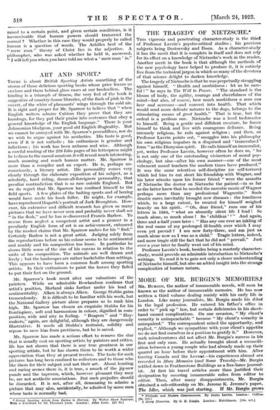THE TRAGEDY OF NIETZSCHE.*
Tins vigororis and penetrating character-study is the third of Professor Lavrin's psycho-critical studies ; his previous subjects being Dostoevsky and Ibsen. As a character-study it has the merit that it is complete in itself and does not rely for its effect on a knowledge of Nietzsche's work in the reader.
Another merit in the book is that although the methods of the new psychology have helped to produce it, it is entirely free from the technical jargon in which so many of the devotees of that science delight to darken knowledge.
The tragedy of Nietzsche is that he was perpetually struggling against himself. " Health and morbidness : let us be care- ful ! " he says in The IV ill to Power. " The standard is the bloom of body, the agility, courage and cheerfulness of the mind—but also, of course, how much morbidness a man can bear and overcome—and convert into health. That which would send more delicate natures to the dogs, belongs to the stimulating means of great health." That is true, but the ordeal is a perilous one. Nietzsche was a hard taskmaster to himself. Being a gentle and diffident creature, he forcer himself to think and live with courageous defiance. Being intensely religious, he rails against religion ; and then, as Professor Lavrin points out, " smuggles into his philosophy his own religious impulses in a disguised and ' transvalued form " as the Dionysian spirit. He calls himself an immoralist, yet, writes Professor Lavrin, however often he does so, " ha is not only one of the outstanding vivisectors of moral psy- chology, but also—after his own manner—one of the most vehement moral teachers the modern times have produced." It was the same relentless self-discipline (or self-torture) which led him to cut short his friendship with Wagner, and his later attacks upon his former friend " were the assaults of Nietzsche the doctor on Nietzsche the patient—in so far as the latter knew that he needed the narcotic music of Wagner perhaps more than any professional Wagnerite." Such drastic cures inevitably brought new diseases : the loneliness which, to a large extent, he created for himself weighed heavily on his spirit. -" Oh, dear friend," runs one of his letters in 1884, " what an absurdly silent life I lead ! So much alone, so much alone ! So ' childless ' t " And again, three and a-half years later : " Has any one ever an inkling of the real cause of my prolonged ill-health over which I may even yet prmYail ? I am now forty-three, and am just as much alone now as I was as a child." Tragic letters, indeed, and more tragic still the fact that he did not " prevail." Just over a year later he finally went out of his mind.
Professor Lavrin's book, besides being a masterly character- study, would provide an admirable introduction to Nietzsche's writings. To read it is to gain not only a closer understanding of Nietzsche himself, but also an added insight into the strange complexities of human nature.


































































 Previous page
Previous page